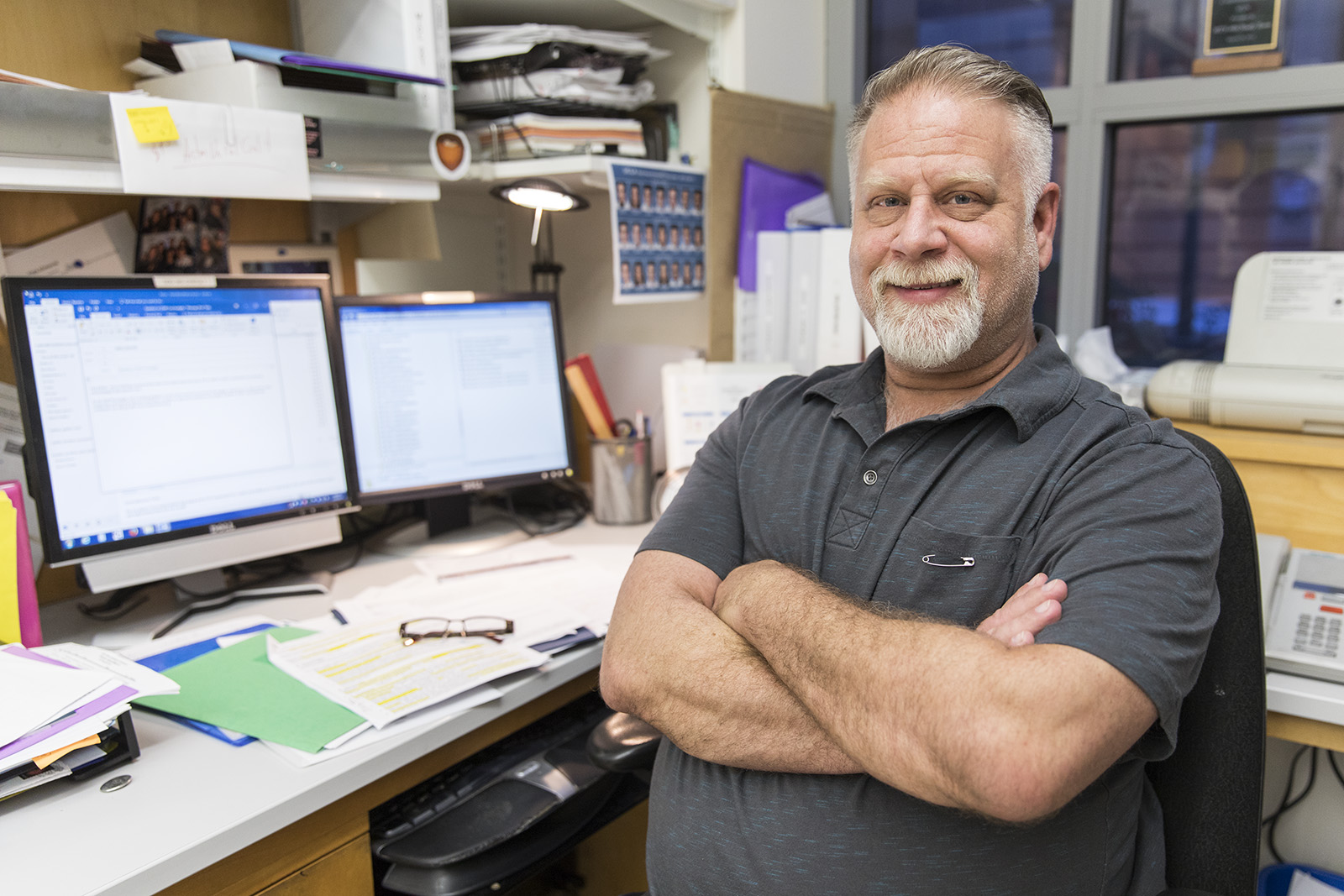Researcher fears Trump presidency will hurt HIV research, LGBTQ community

Justin Akin, administrative director at the UCLA Center for HIV Prevention Research, is an activist for the LGBTQ community and HIV-positive himself. (Dayoung Lee/Daily Bruin)
By Stuart Key
Jan. 20, 2017 11:58 a.m.
Justin Akin spent years watching his friends and colleagues die from HIV/AIDS, only to discover in 1990 that he also carried the disease.
“I spent the ’80s deciding I wouldn’t get tested because I didn’t want to know … if I was going to die,” said Akin, the administrative director at the UCLA Center for HIV Prevention Research.
HIV becomes deadly when the virus persists and causes AIDS. It progressively weakens the immune system, making patients vulnerable to other infections and diseases that eventually kill them.
Throughout the recent presidential campaigns and watching President-elect Donald Trump win the election, Akin has become more worried about his future as both a gay and HIV-positive individual. Akin said he is terrified of a Trump presidency because he thinks Trump’s agenda may leave HIV-positive patients without insurance and could endanger UCLA research funding.
As an activist for the LGBTQ community, Akin said he also fears for the future of their civil rights and same-sex marriage laws.
Akin has more than 30 years of experience working with HIV-positive individuals. He has worked as an activist, a hotline counselor and is currently an administrator for a program that develops microbicides, which are topically applied medicines that would prevent HIV from being transferred.
He has seen the damage the virus can do emotionally and physically as well as the possible treatment and prevention options that have been developed.
Akin’s memories from the AIDS epidemic of the 1980s remind him how important his research is, he said.
“I remember my partner at the time in 1982 reading an article in the Boston Globe about this ‘gay disease,’ and it was terrifying, there was so little information,” Akin said. “There was a funeral a week for a few years.”
Akin started a career in AIDS activism to become more familiar with the disease.
The first experience Akin had with HIV was participating in a volunteer hotline to become more educated about the disease and to help those who had been infected.
Akin said HIV was extremely negatively stigmatized in the 1980s.
Many of the events Akin remembers are about how scared people were to have sex and talk openly about HIV. Akin thinks that the negative view of the disease remains today and has only become marginally better because of developments in treatment.
Akin hesitated to get tested for HIV for years because he felt better not knowing, and the short lifespan of HIV-positive individuals made him feel that there was little reason to know in advance.
“I practiced safe sex for the most part,” Akin said. “But by 1989, I was sick and tired of (practicing safe sex). In 1990, I had a partner who wanted me to get tested … and I tested positive.”
Akin’s condition remained dormant for years, but today he must go through expensive antiretroviral treatment, which consists of taking a mixture of drugs that hinders the replication of the virus. He can only afford the treatment because he has insurance – without it, he would be unable to pay for his medicine.
“Without affordable health insurance, I wouldn’t be here, and I certainly could not afford my treatment,” Akin said.
If the Trump administration and Republican-controlled legislature repeal the Affordable Care Act, Akin said many HIV-positive patients may be left without insurance and a pre-existing condition that he believes insurance companies would balk at covering. Akin added he is also concerned about how a Trump presidency could affect the LGBTQ community, since the disease disproportionately affects them.
Akin said he is also worried that the Trump administration will decrease research funding. He said he thinks a change in research funding for HIV could also impact the LGBTQ community in a negative way. The UCLA Center for HIV Prevention Research receives federal funding but has received funding cuts for years, Akin said.
“I believe that funding will be reduced more, for all kinds of issues, but HIV for sure,” Akin said.
He added he thinks HIV research may lose funding because the public perceives HIV to be less serious than it used to be.
“As someone with a pre-existing condition, I am fortunate that I am currently employed and that I have good health insurance, but who knows where I might be in a year or five years,” Akin said. “I’m terrified that I will be in a place where my HIV will prevent me from receiving health insurance.”


